Intro
The measles vaccine is a crucial component of public health efforts to prevent the spread of measles, a highly contagious and potentially life-threatening disease. Measles, also known as rubeola, is a viral infection that can cause fever, cough, runny nose, and a characteristic rash. Before the widespread use of the measles vaccine, measles was a common childhood illness, but it could also have serious complications, such as pneumonia, encephalitis, and even death. The introduction of the measles vaccine has significantly reduced the incidence of measles worldwide, but it remains a significant public health concern in areas with low vaccination rates.
The importance of the measles vaccine cannot be overstated. According to the World Health Organization (WHO), measles vaccination has saved millions of lives since its introduction in the 1960s. The vaccine is highly effective, with two doses providing about 97% protection against measles. However, to achieve herd immunity and prevent the spread of measles, it is essential to maintain high vaccination rates. This is particularly important in areas with low vaccination rates, where measles outbreaks can occur. The measles vaccine schedule is designed to provide optimal protection against measles, and it is crucial to follow the recommended schedule to ensure that individuals, especially children, are protected against this disease.
The measles vaccine is typically administered in combination with other vaccines, such as the mumps and rubella vaccines, in a vaccine known as the MMR (measles, mumps, and rubella) vaccine. The MMR vaccine is usually given in two doses, with the first dose administered at 12-15 months of age and the second dose at 4-6 years of age. This schedule may vary depending on the country, region, or individual circumstances, such as travel plans or exposure to measles. It is essential to consult with a healthcare provider to determine the best vaccination schedule for each individual.
Measles Vaccine Benefits
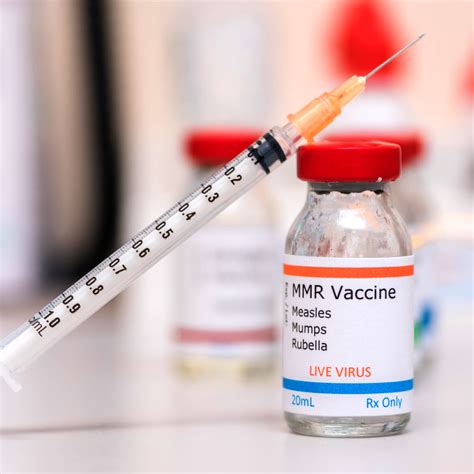
The measles vaccine has several benefits, including preventing measles infection, reducing the risk of complications, and protecting against other diseases. The vaccine is highly effective, with two doses providing about 97% protection against measles. This means that if an individual is exposed to measles, the vaccine will prevent the disease in about 97% of cases. Additionally, the measles vaccine can help prevent the spread of measles in communities, reducing the risk of outbreaks and protecting vulnerable individuals, such as those with weakened immune systems.
The measles vaccine can also reduce the risk of complications from measles, such as pneumonia, encephalitis, and death. According to the Centers for Disease Control and Prevention (CDC), one in five children with measles will develop pneumonia, and about one in 1,000 will develop encephalitis, a potentially life-threatening complication. The measles vaccine can help prevent these complications, reducing the risk of serious illness and death.
How the Measles Vaccine Works
The measles vaccine works by introducing a small, harmless piece of the measles virus to the body, which triggers an immune response. This immune response helps the body recognize and fight the measles virus, providing protection against future infections. The vaccine contains a weakened or killed form of the measles virus, which is not capable of causing disease. However, it is still able to stimulate an immune response, providing protection against measles.The measles vaccine is typically administered via injection, usually in the thigh or upper arm. The vaccine is given in two doses, with the first dose administered at 12-15 months of age and the second dose at 4-6 years of age. This schedule may vary depending on individual circumstances, such as travel plans or exposure to measles. It is essential to consult with a healthcare provider to determine the best vaccination schedule for each individual.
Measles Vaccine Schedule
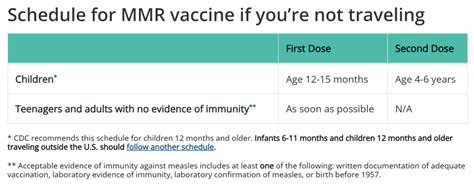
The measles vaccine schedule is designed to provide optimal protection against measles. The schedule typically involves two doses of the MMR vaccine, with the first dose administered at 12-15 months of age and the second dose at 4-6 years of age. This schedule may vary depending on individual circumstances, such as travel plans or exposure to measles. It is essential to consult with a healthcare provider to determine the best vaccination schedule for each individual.
The first dose of the MMR vaccine is usually administered at 12-15 months of age. This dose provides initial protection against measles, mumps, and rubella. The second dose is typically administered at 4-6 years of age, providing additional protection and boosting the immune response. This dose is especially important for children who may be exposed to measles in school or other settings.
Special Considerations
There are special considerations for certain individuals, such as those with weakened immune systems, pregnant women, and individuals with allergies. For example, individuals with weakened immune systems, such as those with HIV/AIDS or cancer, may require additional doses of the MMR vaccine or special precautions to prevent complications. Pregnant women should avoid getting the MMR vaccine during pregnancy, as it is a live, attenuated vaccine. However, women who are breastfeeding can safely receive the MMR vaccine.Individuals with allergies, such as an allergy to eggs or gelatin, may require special precautions or alternative vaccines. For example, the MMR vaccine is produced using chicken embryo cell cultures, which may contain small amounts of egg protein. However, the amount of egg protein is extremely small, and the risk of an allergic reaction is low. It is essential to consult with a healthcare provider to determine the best course of action for individuals with allergies or special considerations.
Measles Vaccine Side Effects
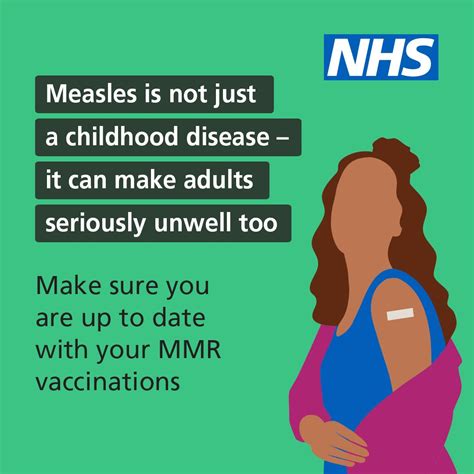
Like all vaccines, the measles vaccine can cause side effects, although these are typically mild and temporary. Common side effects of the MMR vaccine include pain, redness, or swelling at the injection site, as well as fever, headache, and fatigue. These side effects usually resolve on their own within a few days and do not require medical attention.
In rare cases, the MMR vaccine can cause more serious side effects, such as allergic reactions, seizures, or brain damage. However, these side effects are extremely rare, occurring in less than one in a million doses. It is essential to consult with a healthcare provider if you experience any unusual or severe side effects after receiving the MMR vaccine.
Measles Vaccine Effectiveness
The measles vaccine is highly effective, with two doses providing about 97% protection against measles. This means that if an individual is exposed to measles, the vaccine will prevent the disease in about 97% of cases. The vaccine is also effective in preventing the spread of measles in communities, reducing the risk of outbreaks and protecting vulnerable individuals, such as those with weakened immune systems.The measles vaccine has been shown to be effective in preventing measles outbreaks and reducing the incidence of measles worldwide. According to the WHO, measles vaccination has saved millions of lives since its introduction in the 1960s. The vaccine is also cost-effective, with a study published in the Journal of Infectious Diseases estimating that every dollar invested in measles vaccination returns about $16 in economic benefits.
Measles Vaccine Recommendations
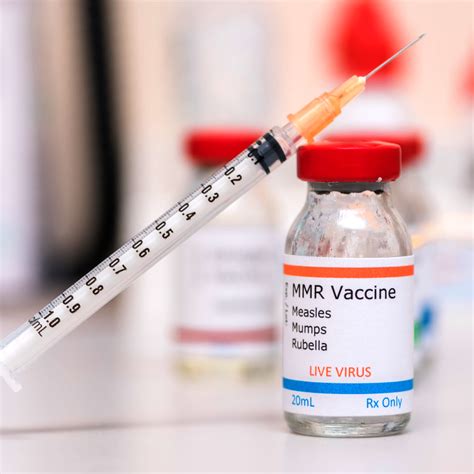
The measles vaccine is recommended for all individuals, especially children, to prevent measles infection and reduce the risk of complications. The CDC recommends that children receive two doses of the MMR vaccine, with the first dose administered at 12-15 months of age and the second dose at 4-6 years of age. Adults who have not received the MMR vaccine or have not had measles may also need to receive the vaccine, especially if they work in healthcare, travel internationally, or are at high risk of exposure to measles.
The measles vaccine is also recommended for individuals who are at high risk of exposure to measles, such as healthcare workers, international travelers, and individuals who work with children. These individuals may require additional doses of the MMR vaccine or special precautions to prevent complications. It is essential to consult with a healthcare provider to determine the best course of action for individuals who are at high risk of exposure to measles.
Measles Vaccine Safety
The measles vaccine is safe and effective, with a long history of use in preventing measles infection and reducing the risk of complications. The vaccine has undergone extensive testing and monitoring, and its safety and effectiveness have been well established. The CDC and other health organizations closely monitor the safety of the measles vaccine, and any concerns or adverse reactions are thoroughly investigated.The measles vaccine is also subject to strict manufacturing and quality control standards, ensuring that the vaccine is produced and distributed safely and effectively. The vaccine is manufactured using a process that involves growing the measles virus in chicken embryo cell cultures, which are then inactivated or killed to produce the vaccine. The vaccine is then tested for safety and effectiveness before it is released for use.
Measles Vaccine FAQs
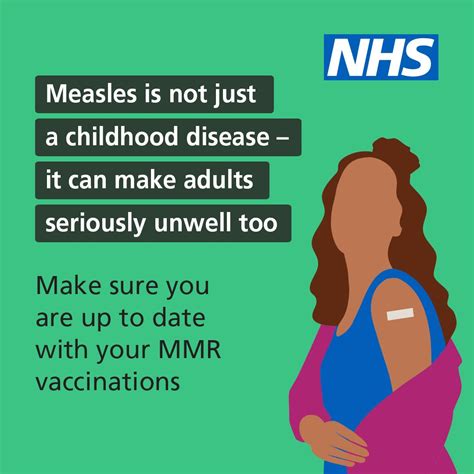
Here are some frequently asked questions about the measles vaccine:
What is the measles vaccine?
+The measles vaccine is a vaccine that protects against measles, a highly contagious and potentially life-threatening disease.
How is the measles vaccine administered?
+The measles vaccine is typically administered via injection, usually in the thigh or upper arm.
What are the benefits of the measles vaccine?
+The measles vaccine can prevent measles infection, reduce the risk of complications, and protect against other diseases.
Measles Vaccine Importance
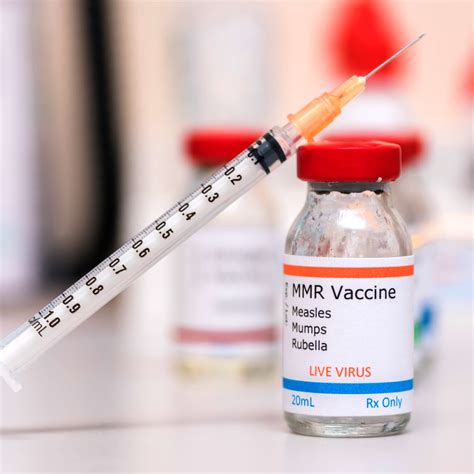
The measles vaccine is essential for preventing measles infection and reducing the risk of complications. Measles is a highly contagious disease that can spread quickly in communities, especially in areas with low vaccination rates. The measles vaccine can help prevent the spread of measles, protecting vulnerable individuals, such as those with weakened immune systems, and reducing the risk of outbreaks.
The measles vaccine is also important for global health security, as it can help prevent the spread of measles across international borders. Measles is a highly contagious disease that can be spread through international travel, and the measles vaccine can help prevent the introduction and spread of measles in new areas.
In conclusion, the measles vaccine is a crucial component of public health efforts to prevent the spread of measles, a highly contagious and potentially life-threatening disease. The vaccine is highly effective, safe, and essential for preventing measles infection and reducing the risk of complications. It is essential to follow the recommended measles vaccine schedule and to consult with a healthcare provider to determine the best course of action for each individual. By working together, we can prevent the spread of measles and protect vulnerable individuals, especially children, from this serious disease. We encourage you to share this article with others, ask questions in the comments section, and take action to protect yourself and your loved ones from measles.
